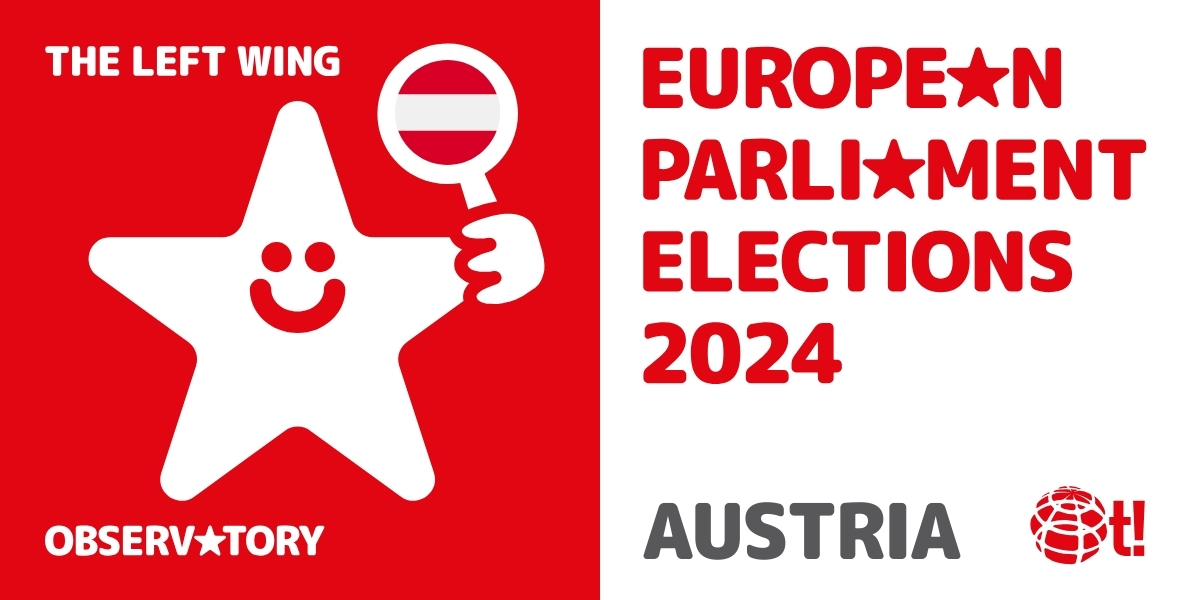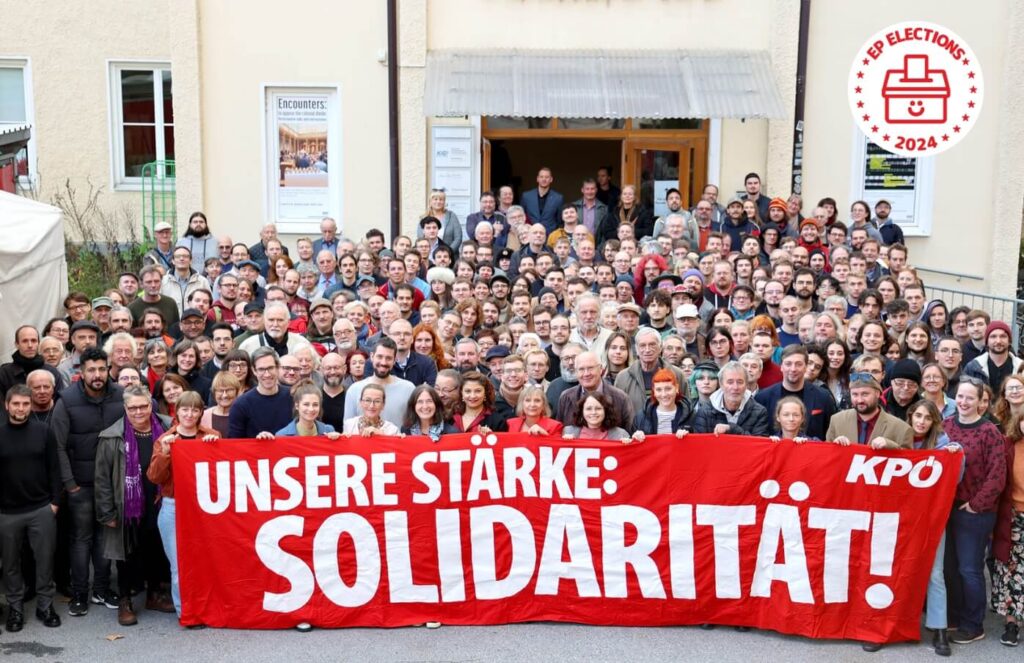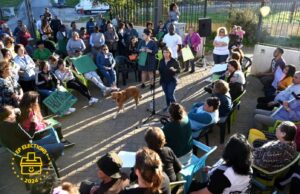
The ongoing multi-crisis has led to social upheavals in Austria which mainstream parties barely perceived, and the far-right FPÖ might emerge as the strongest party from the elections. As for the KPÖ, it might successfully make the leap into both the European and national parliaments, leveraging a successful trend in local elections.
In the nights of mid-May 2024, a rare natural spectacle took place in Europe. Due to a solar storm, the northern lights, also known as Aurora, were partially visible to the naked eye in Austria. While the mountains are cloaked in a flickering red at night, it also seems conceivable that the starting signal for a significant social change in the country has already been given: After several regional elections, an almost revolutionary change is in the offing, effecting the Austrian political landscape, a resurrection of the Communist Party (KPÖ) 65 years after it was last represented in the National Parliament.
In the municipal elections in Austria’s second largest city, Graz, in September 2021, the KPÖ became the strongest party with over 28% of the vote, which resulted in Elke Kahr being elected mayor, and this in spite of being a communist. An equally impressive development was seen in the city of Salzburg in March 2024, where the party became the second strongest force with 22%. Just a few weeks later, in April 2024, the KPÖ in Innsbruck made it onto the municipal council at the first attempt with 7% or three seats. The fact that the party was able to succeed in all cases is largely due to the social upheavals resulting from the European multi-crisis – and, also, to a political style that involves acting on an equal footing with voters. This involves addressing people’s problems in personal consultations and providing them with concrete support. The funds for this come from the salaries of the office holders: they are only allowed to keep an average skilled worker’s salary for themselves and donate everything above this to the party’s social fund.
Pandemic, War and Inflation
The ever-developing multi-crisis had far-reaching consequences in all European countries. The conservative-green government consisting of the ÖVP and the Greens, which took the helm in autumn 2019, stumbled into the pandemic right at the start of its term of office. While an extensive health monitoring and vaccination campaign was launched, the economic focus was on the introduction of reduced working hours, working from home and business support. While people tried to protect themselves and their environment in various lockdowns, often struggling to maintain their standard of living, at least €16 billion was channelled to companies without any significant controls or conditions with entrepreneurs associated with the conservative ÖVP party benefitting, in particular. Meanwhile, a social crisis had begun to unfold in the background that had been barely recognised by mainstream politics.
“Homes, Not Drones“(1)
In Austria, there is a passage in tenancy law that had comparatively unproblematic consequences in times of low inflation: landlords adjust the rent to the general inflation rate twice a year. However, in recent years of high inflation, this meant that the many people in Austria who rent have had to cope with additional expenditure of up to 30 % – while wages were only increased by just under 9 % at a late stage. The conservative-green government ignored the problem, as did the Social Democrats, who could have taken counter-measures in Vienna. Only the KPÖ focussed on the looming social crisis and was able to turn this into a series of successes in regional elections. Meanwhile, the massive rearmament in the EU, which quite contrary to the euro crisis involves no more calls for budget discipline, is a clear sign that peace policy is currently not a prospect for the European political elites in view of the war in Ukraine. Despite Austria’s neutrality, which is enshrined in the state treaty, Austrian-made rifles and pistols are being sent to Russia and Iran via detours. The transport of armoured vehicles through the country’s territory to the east is also increasing – in defiance of neutrality. Representatives of the party always explain in interviews that they want to stand up for peace instead of choosing one side of dying. Here too, the KPÖ’s criticism is a unique selling point, despite the demagogy of the far-right FPÖ. This party, among other things, calls the Ukrainian president a warmonger, and had entered into a friendship treaty with “United Russia” in 2016, shining a special light on its one-sided partisanship in the current conflict.
From Vienna to Brussels
Regardless of the war, elections for the European Parliament are not taken particularly seriously in Austria. In 2019, the voter turnout was just under 60% while in previous elections participation was usually well below 50%. The reasons for this development are likely to be manifold: on the one hand, there is an awareness of the democratic deficits within the EU, where a complicated power structure prevails in which an unelected EU Commission sets the course in coordination with the national governments. The European Parliament, with its very limited competences, is more reminiscent of the beginnings of bourgeois democracy in the 19th century. On the other hand, EU scepticism that prevails among at least a third of voters also has chauvinistic to conspiracy-theory traits. It remains to be seen whether this development will actually be exacerbated by a shift to the right in the EU elections, as predicted in the current polls.
Extreme Right on the Rise
The far-right FPÖ, which has now positioned itself on the right fringe of the ID group, is currently fluctuating between 27 and 30% in the polls and will potentially double its share of seats from three to six. This would mean that the right-wing extremists would emerge from the elections as the strongest party. While the conservative governing party ÖVP is likely to lose two to three of its current seven seats, the Greens are also struggling with a scandal regarding the credibility of their young lead candidate, who has outgrown the climate movement and is increasingly at odds with her former left-wing environment. The first consequence of this was that the Greens’ poll ratings shrank from around 14% to 9%, which would mean the loss of one mandate (previously: three). The three remaining parties, the Social Democrats, the (neo-)liberal “Neos” and the KPÖ, are likely to benefit from this development. The Social Democratic SPÖ, whose current leader Andreas Babler has described himself as a “Marxist” but does not have much support within the party, is currently slightly ahead of the ÖVP and could defend second place with 24% and five seats. The Liberals, on the other hand, could significantly improve their result with around 15% or two to three seats, based on just one mandate.
Street Campaigning as Anti-fascism
However, the big question in this election will be to what extent the KPÖ will actually succeed in convincing enough left-wing voters, segments of previous non-voters and also FPÖ sympathisers. The pointedly down-to-earth approach of the election campaign, which also specifically attempts to appeal to Eurosceptic voters on the extreme right, opens up new perspectives, but also represents a balancing act with regard to the previously loyal core electorate. Another focus of the campaign is the sharp criticism of lobbying at European level, which undermines the political sovereignty of all people in Europe. It remains to be seen whether at the end of the day the polling institutes will be correct in their predictions of only 2 to 4 % for the KPÖ. This is because the party was systematically underestimated in the polls in the run-up to the regional elections in Styria, Salzburg and Innsbruck. Public broadcasting also offers the KPÖ only a fraction of the time in election coverage that is given to other parties, a relic of the anti-communism that used to be widespread. Ultimately, it will be down to the KPÖ’s extremely committed street campaign whether it manages to break through the 4% barrier. The KPÖ is reinforced by an offensive by communist youth and student organisations as well as by organising concepts, focusing on those areas where social need is greatest and voter turnout has so far been very limited. The leading candidate and party chairman, Günther Hopfgartner, is at the forefront and, as the manager of a coffeeshop, occasionally serves drinks himself as part of the campaign. The chances that an Austrian communist will be represented in the European Parliament for the first time are plainly intact.
From Brussels to Vienna
In any case, the European elections are also an important stopover for the KPÖ: the National Council is expected to be elected in Austria on 29 September this year. There, too, according to the polls, the party might be about to enter Parliament, 65 years after it was last represented. If the double sensation does indeed materialise and the party successfully makes the leap into both the European and national parliaments, the Aurora may not have promised too much by Austrian standards in May. A quantum leap for the left in Austria is within reach.
(1) The slogan in German is “Wohnen statt Kanonen”, which rhymes and literally translates as “Housing instead of cannons”. It also refers to a poem by Bertolt Brecht.
Cover image: Group photo of party members at the Party conference for the European elections in Graz, November 2023. Banner: Our strength: Solidarity. Source: KPÖ Facebook account.



